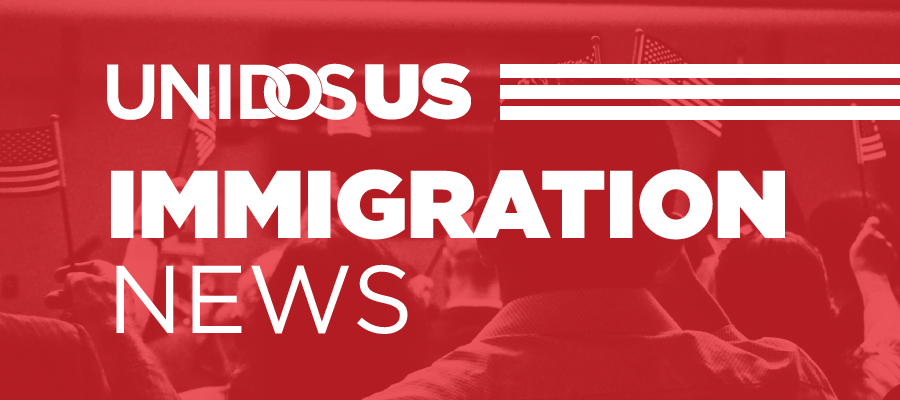UNIDOS US COMMENTARY:
Education Department’s Rule on COVID-19 Emergency Grant Aid Is a Dangerous Step Back for Undocumented Students

By UnidosUS Higher Education Policy Analyst Amanda Martinez and UnidosUS Education Policy Advisor Roxanne Garza
Late on Thursday, the U.S. Department of Education (ED) released a new regulation that officially prohibits the 450,000 undocumented students enrolled in today’s U.S. postsecondary system from accessing critical emergency financial aid provided to help cover costs brought on by the coronavirus pandemic. This comes after a series of conflicting announcements from ED regarding enforcement over these provisions and could lead to a heated legal battle.
Through the Coronavirus Aid, Relief, and Economic Security (CARES) Act, Congress provided more than $6 billion in emergency financial relief to college students experiencing COVID-19–related disruptions to cover a range of expenses including, food, housing, health care, technology, and course materials. The CARES Act made no statements about excluding certain students. But in April, U.S. Secretary of Education Betsy DeVos issued guidance stipulating which students the department deems eligible.
Keep up with the latest from UnidosUS
Sign up for the weekly UnidosUS Action Network newsletter delivered every Thursday.
Although that earlier guidance did not have the force of the law, the new interim final rule will carry legal weight and take effect after it is published in the Federal Register, which is expected on Monday. This shameful rule will have a chilling effect on the lives of undocumented, Deferred Action for Childhood Arrivals (DACA), Temporary Protected Status, international, justice–impacted, and other students who have not applied for financial aid.
The pandemic has made clear that our health and economic well-being are interconnected. Measures such as this action by the ED are a dangerous step back in putting this crisis behind us. UnidosUS believes that DeVos’s decision to issue this rule during a national public health crisis will cause a major disruption to the lives of Latino students and families particularly for those who are undocumented, who are feeling the brunt of the crisis. Nearly half of Latinos (49%) have reported that someone in their household lost their job or experienced a pay cut due to the pandemic-related shutdowns of certain sectors of the economy. At the same time, many Latinos find themselves working on what are deemed essential jobs that put them at risk for virus exposure. And even before the pandemic, 18% of Latinos were uninsured compared to approximately 5% of non-Hispanic Whites, making this population even more vulnerable to the virus. This puts Latino college students at a higher risk of exposure to disruptions caused by COVID-19.
Undocumented students face greater barriers to accessing care and employment due to their immigration status. They are also more likely to pay higher rates of tuition and work to help pay for college. On average, undocumented students who pay out-of-state tuition have to work more than 35 hours a week to cover college expenses, while those with in-state tuition work about 23 hours a week.
UnidosUS believes barriers like these are unfair to a population known for using their college degrees to make crucial contributions to American society. According to data from the Migration Policy Institute, DACA recipients include 9,000 K-12 teachers. The New American Economy reports that there 280,000 of America’s healthcare workers are DACA recipients. And a report prepared by the House Congressional Committee on Small Business, shows that some 40,000 DACA recipients are small business owners.
But research from UnidosUS also shows that Latinos are more likely than their White peers to be first-generation college students, live in poverty, and have lower wealth. According to a national poll by SOMOS Health Care, UnidosUS and MoveON, 54% of Latinos are concerned that they or someone in their family will not be able to afford to return or start college next semester. Income volatility, loss of income, and unexpected college costs force Latino students to make adverse tradeoffs between covering basic needs or continuing their studies. This reality is exacerbated for undocumented students. This spring, a survey by the non-profit organization TheDream.US, found that 80% of DACA students who worked while in school experienced loss of income or temporary or permanent job losses in March, when many states went into pandemic shutdown. The students reported that they were struggling to pay for rent and utilities, food and meals, and mental health services.
This is the scenario policymakers were hoping to mitigate against when they passed the CARES Act. In issuing the new rule on student exclusions, ED is likely to face serious legal battles as states and college systems were already challenging the earlier guidance. The largest system of higher education in the country, the California Community College System, filed a lawsuit in May claiming the department’s guidance was unconstitutional and overreaches their discretion as an agency. The California sytem claimed that ED prevented 70,000 undocumented students and more than 800,000 community college students in California by stipulating federal student aid eligibility requirements.
The state of Washington has filed a suit for the same issue, saying the guidance will leave out 85,000 of its students. These cases are expected to go through lengthy appeals, which means the students currently impacted by the rule are unlikely to reap any benefits should courts rule in the states’ favor.
It is now up to Congress to decide whether undocumented students receive emergency aid in the future. Congress is deliberating on a fourth COVID-19 relief package that could provide additional support and potentially close gaps that were left by the CARES Act. In May, the House of Representatives passed the Health and Economic Recovery Omnibus Emergency Solutions (HEROES) Act, which includes $37 billion in COVID-19 relief to institutions of higher education and clarifies that undocumented students would be eligible for emergency grants from these funds.
Specifically, the legislation would prohibit the Secretary from defining the population of postsecondary students who may receive emergency student grant aid (other than that they be enrolled in the institutions), retroactively applying this to the CARES Act. It also ensures the Personal Responsibility Work Opportunity Reconciliation Act of 1996 (PRWORA) cannot be applied. This is critical since the PRWORA prohibits immigrants without legal residency status from accessing any type of welfare public benefit. This means that undocumented college students would be eligible to receive emergency grant aid retroactive to the funds distributed through the CARES Act.
The Senate now has the opportunity to help nearly half a million undocumented students and millions of other college students by passing the HEROES Act, but Senate Republicans are unlikely to take up the House passed bill. UnidosUS is urging the Senate, as they develop that chamber’s latest COVID-19 response, to include the language from the House passed HEROES bill described above. UnidosUS is actively advocating for the inclusion of these provisions and others that would benefit Latino students in any subsequent relief package.




